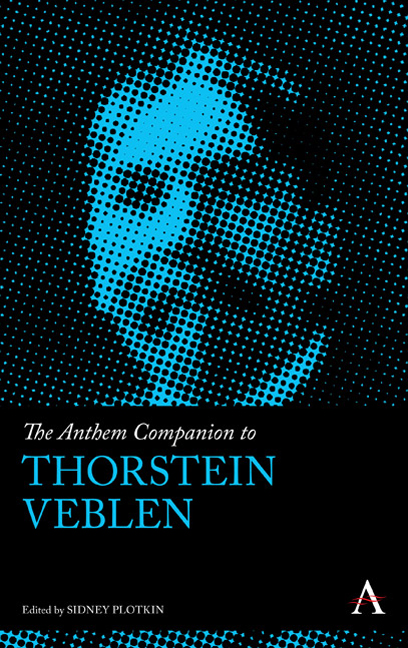Book contents
- Frontmatter
- Dedication
- Contents
- Acknowledgments
- Introduction: Thorstein Veblen's Elusive Project
- Part I METHOD, PHILOSOPHY AND VALUES
- Contents
- Chapter One The Instinct of Workmanship and Other Philosophical Concepts in Thorstein Veblen's Methodology
- Chapter Two Reconsidering Thorstein Veblen's Use of Instincts
- Chapter Three Roman Catholic Critics of Thorstein Veblen and Institutional Economists
- Chapter Four The Metaphysical World of Thorstein Veblen: Of and Beyond the Here and Now
- Chapter Five Veblen's Position on Education Analyzed and Reformulated
- Part II CAPITALISM, SOCIAL STRUCTURE AND POLITICS
- List of Contributors
- Index
Chapter One - The Instinct of Workmanship and Other Philosophical Concepts in Thorstein Veblen's Methodology
from Contents
Published online by Cambridge University Press: 10 January 2018
- Frontmatter
- Dedication
- Contents
- Acknowledgments
- Introduction: Thorstein Veblen's Elusive Project
- Part I METHOD, PHILOSOPHY AND VALUES
- Contents
- Chapter One The Instinct of Workmanship and Other Philosophical Concepts in Thorstein Veblen's Methodology
- Chapter Two Reconsidering Thorstein Veblen's Use of Instincts
- Chapter Three Roman Catholic Critics of Thorstein Veblen and Institutional Economists
- Chapter Four The Metaphysical World of Thorstein Veblen: Of and Beyond the Here and Now
- Chapter Five Veblen's Position on Education Analyzed and Reformulated
- Part II CAPITALISM, SOCIAL STRUCTURE AND POLITICS
- List of Contributors
- Index
Summary
The outcome of any serious research can only be to make two questions grow where one question grew before.
Thorstein VeblenIf it is at all true that Thorstein Veblen is “still misunderstood but more important now than ever,” as Robert Frank has recently asserted (2012), this has implications for Veblen scholarship. Veblen was an economist by calling, and Ken McCormick (2006) has explicated some of his central economic tenets, by putting them “in plain English,” as his title nicely tells. In Veblen's time, and in his own thinking, “economics” had a wider connotation than it has today, so that his work needs to be assessed also from wider viewpoints, and Geoffrey Hodgson and Rick Tilman have produced many informative studies that contextualize his thinking. However, the explicative task is not yet over. There is still work to be done, in making Veblen's work more accessible to a wider audience, and in showing just how it may make good sense. For this task, Veblen himself used an apt term, the “preconceptions” in different theories, which he strived to make explicit, while picking apart other economists’ doctrines (see in particular 1899– 1900).
Preconceptions can be empirical, such as those that a scholar adopts from other disciplines, outside his or her own expertise. Veblen often liked to refer to biology, psychology, or anthropology as support for his economic conclusions. Besides this, a scholar often follows some philosophical preconceptions are usually more tacit than straight borrowings from empirical science. According to Karl Popper's famous dictum, everything we say or do reflects some philosophy, and the question is only whether we realize this or not. This may not always be literally true, but I agree that philosophical preconceptions play a considerable role outside philosophy proper, particularly in the human sciences. In this chapter I attempt to unravel some philosophical and other preconceptions that Veblen relied on in his theorizing, and which, it seems to me, have not so far received all the attention that they deserve.
What the World Is Like
To say that philosophical issues bear on empirical research is not to say anything new, but the order of those issues has not always been sufficiently considered.
- Type
- Chapter
- Information
- The Anthem Companion to Thorstein Veblen , pp. 21 - 38Publisher: Anthem PressPrint publication year: 2017

